
Times of Israel
By Raphael Ahren
November 1, 2018
Do Netanyahu’s visit in Oman and ‘Hatikva’ playing in Abu Dhabi show that normalization with the Arab world is not tied to progress in the peace process? Not so fast, analysts warn
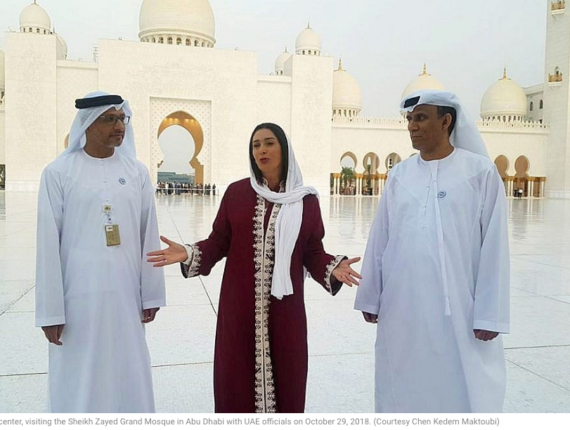
Israel’s ties with the Arab world took a giant leap forward in recent days, with a series of dramatic — even historic — events that seemed to indicate that some of the Jewish state’s neighbors are at long last accepting it as a legitimate member of the family of nations.
Oman, Bahrain and the United Arab Emirates made important gestures toward Israel over the last few days, despite the fact that Israel’s relations with its closest neighbors, the Palestinians, remain dismal.
A peace agreement is as elusive as ever, yet today it can no longer be denied that some Sunni Arab states are slowly but surely opening up to Israel. This seemingly disproves the hypothesis, advanced by some, that no normalization with the Muslim world can take place in the absence of significant progress in the Israeli-Palestinian conflict.
Yet, despite the abundance of good news in Israel-Gulf relations, the peace process is still a glass ceiling that must be shattered before full normalization can take place, several analysts warned this week.
On Friday, Prime Minister Benjamin Netanyahu was warmly welcomed in Muscat by Omani Sultan Qaboos bin Said, becoming the first Israeli official to publicly visit the country in more than two decades.
“These were important talks — both for the State of Israel and very important talks for Israel’s security,” Netanyahu said Sunday, vowing that there “there will be more” visits to Arab countries.
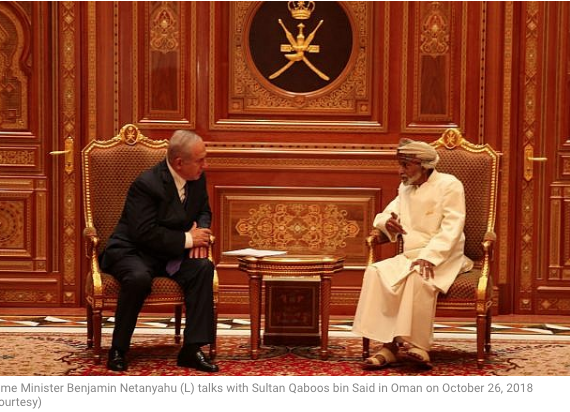
The significance of the Qaboos-Netanyahu meeting was not lost on anyone dealing with Middle East affairs.
“We welcome the warming ties & growing cooperation between our regional friends,” US peace envoy Jason Greenblatt tweeted on Friday. “This is a helpful step for our peace efforts and essential to create an atmosphere of stability, security and prosperity between Israelis, Palestinians their neighbors.”
Even some of Netanyahu’s toughest critics acknowledged that the Oman trip was a major achievement.
“Relations with the Arab world are of strategic importance for the State of Israel. We are a natural part of the Middle East and the countries of the region need to understand that we are here to stay,” opposition MK Yair Lapid told The Times of Israel. “I welcome the prime minister’s visit to Oman and the willingness of the sultan to publicize this visit.”
Netanyahu’s eight-hour meeting with Qaboos, during which the Israeli leader and his wife, Sara, were treated to a lavish dinner and a performance of traditional Omani music, would have been enough to cast doubts on the theory that the Arab states will not publicly warm to Israel as long as their Palestinian brethren remain stateless.
But it was just the beginning.
On Saturday, after Netanyahu’s trip to Muscat had been celebrated on the front pages of several Omani newspapers, the country’s foreign minister, Yussef bin Alawi bin Abdullah, suggested at a conference in Bahrain that the time had come for Israel to be treated like any other state in the region. Remarkably, his colleagues from Manama and Riyadh did not disagree, even expressing tacit support for Oman’s efforts to help advance the peace process.
Alawi’s comments garnered praise from Greenblatt, who called it an “encouraging sign and step forward in creating an atmosphere favorable for peace.”
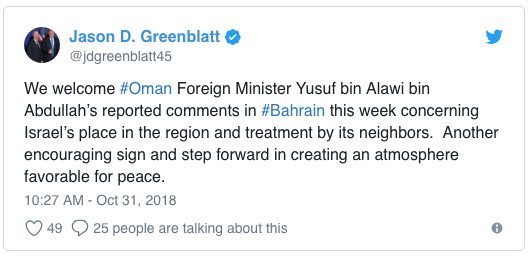
On Sunday, about 500 kilometers east of Muscat, Israeli judoka Sagi Muki defeated Belgian competitor Matthias Casse to take first place in the under-81 kilogram category at the Abu Dhabi Grand Slam.
Culture and Sports Minister Miri Regev had tears streaming down her face as she listened to Hatikva, the Israeli national anthem, being played for the first time on the Arabian Peninsula.
Just last year, Tal Flicker, who won a gold medal at the same venue, was not allowed to display the Israeli flag. And after his victory in the under-66 kilograms category, the International Judo Federation’s (IJF) anthem was played instead of Hatikva.
Israel’s national symbols being honored on UAE soil transcended the world of sports, said IJF president Marius Vizer, calling it “a crucial moment in the world.”
Netanyahu, too, attributed great importance to Muki’s achievement, telling the fresh gold medalist that he was “also contributing to Israel’s diplomatic effort in the Arab world.”
On Monday, Regev was accompanied by Emirati officials to the Sheikh Zayed Grand Mosque, the third-largest Muslim house of worship in the world, and a site regularly shown to world leaders visiting the country.
The first-ever official state visit to the mosque by an Israeli minister was something veteran analysts said they never imagined could happen in their lifetime.
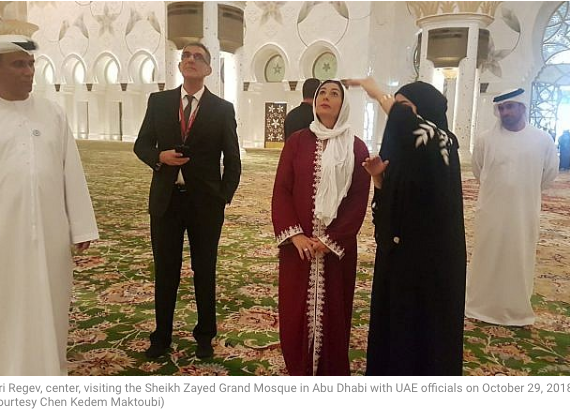
Two other Israeli ministers visited or are going to visit the Gulf in an official capacity: Communications Minister Ayoub Kara on Tuesday addressed the International Telecommunication Union’s Plenipotentiary Conference in Dubai, and Transportation Minister Israel Katz was invitedto the World Congress of the International Road Transport Union in Muscat, where he will promote his “Tracks for Regional Peace” initiative aiming to establish a trade route connecting Europe with Israel and the Persian Gulf.
Greenblatt, the US envoy, on Wednesday hailed Oman, Bahrain and the UAE for their “statements and/or gestures signaling warmer ties with Israel.”

Some of those events — though not all — are truly extraordinary, many analysts agreed, pointing to the common enmity toward Iran that brings Israel and the Arab world together.
“Oman can be a means for communicating with the Iranians, a role Oman can play like few others,” said Dennis Ross, a former US diplomat and top Middle East adviser to several US presidents. “As for the other Sunni leaders, Israel is seen as reliable in terms of its opposition to Iran and is seen as not just talking but doing.”
But those Arab states are still unlikely to translate their admiration for Israel into a radically different public relationship with the Jewish state in the near future, Ross cautioned.
“They don’t see the need, and there is some risk because of the Palestinian issue,” he explained. “But the more even private relationships become the norm, the more they will prepare the ground for limited public moves taking place.”
Rabbi Marc Schneier, an interfaith activist who regularly travels to the region and has good relations with the ruling families of Saudi Arabia, Qatar, Bahrain and other Gulf states, said he was recently told by a top official in the Gulf that the one issue that unites the entire Arabian Peninsula “is their feeling that they need to establish relations with Israel.”
“It is the only issue that transcends all our disagreements,” Schneier quoted the official as saying.
“You get the sense that everyone is trying to out-Israel the other,” the rabbi-activist said. “We’re living in remarkable times.”
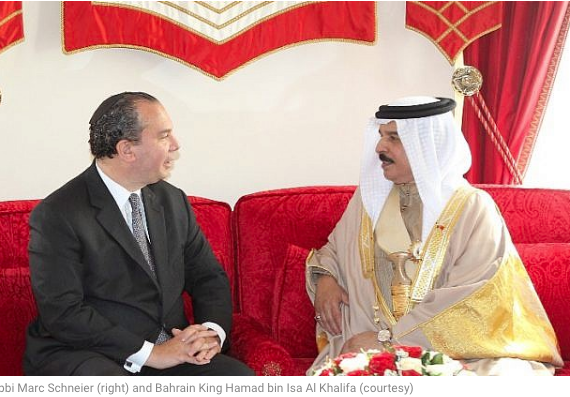
And yet, there needs to be “some kind of tangible movement, some demonstrable efforts” to solve the Israeli-Palestinian conflict before the Gulf states will agree to establish formal relations with Israel, he added.
UAE caved to pressure from the International Judo Federation
Netanyahu’s warm reception in Muscat, and the absence of an outcry throughout the Arab world, was by far the biggest breakthrough of the last few days. As moving as it was for many Israelis was to see Hatikva played in Abu Dhabi, the Emiratis did not do it out of a sudden desire to honor Israel’s national anthem.
Rather, it followed a threat by the International Judo Federation, which had suspended the 2018 Grand Slam until the Emirati authorities committed in writing to providing equal rights to all countries.

The fact that ministers Kara and Katz are going to Gulf states is also not entirely surprising.
They are attending international conferences, the organizers of which are obligated to host representatives of every member state. The participation of Israeli officials in summits across the Arab world has been fairly standard for the last few years.
But why did Oman take the extraordinary step of hosting the leader of the Jewish state?
Qaboos, the Arab world’s longest serving monarch, has consistently supported Arab-Israeli peace efforts, said Sigurd Neubauer, a Middle East analyst based in Washington.
“When Egypt made peace with Israel in 1979, Oman was the only Gulf country not to boycott Egypt,” he said. Similarly, in the early 1990s Qaboos invited then-prime minister Yitzhak Rabin to Oman to demonstrate support for the Israeli-Jordanian peace treaty he was negotiating with King Hussein.
Oman has also quietly but actively supported Israeli-Palestinian peacemaking since the Oslo Accords by backing the Middle East Desalination Research Center, a Muscat-based organization that brings together scientists from Israel, the Palestinian territories, Jordan, Qatar and elsewhere to discuss water cooperation, according to Neubauer.

The contacts between Netanyahu’s office and the authorities in Muscat began about a year and a half ago, a senior official told reporters this week. That the meeting took place now is likely linked to the US administration’s forthcoming peace plan, several analysts said.
“Because Oman is trusted by both Israel and Palestine, it is uniquely positioned at this moment in time to support President Trump’s peace efforts, as the [rest of the] Arab world is facing increasing turmoil,” Neubauer said.
“Oman is perhaps the only Arab country where Netanyahu would be warmly welcomed and where his visit would not trigger any domestic backlash, nor would it contribute to the deepening the existing regional divisions among the Gulf states amid the crisis over Qatar,” he added.

Yoel Guzansky, a senior fellow at Tel Aviv University’s Institute for National Security Studies, agreed that the invitation to Netanyahu was mostly a gesture toward Washington.
“He didn’t do it for us. He did it for the American president, who says he will soon present us with the deal of the century,” said Guzansky, who wrote his doctorate on Omani foreign policy.
At the same time, the friendly welcome Qaboos extended to Netanyahu by no means disproves the theory that full normalization is impossible so long as the Palestinian problem remains unsolved, he stressed.
“The Palestinians are still the glass ceiling for Arab-Israel normalization. And this glass ceiling is being eroded, but it is still there,” he said. The increasingly positive attitude by Oman, UAE, Bahrain and others can best be explained with the desire to remain on Trump’s good side, he posited.
“I think the administration asked the Gulf states, especially the smaller ones, to make gestures toward Israel, including confidence-building toward Israel,” Guzansky surmised.
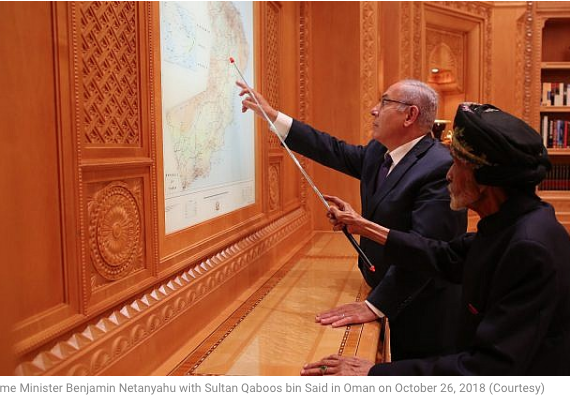
Netanyahu deserves credit for a great achievement, but ultimately his short trip to Muscat amounts to little more than “a show,” he went on.
“We didn’t break the barrier, and with all due respect to the prime minister’s visit to Oman, we have to see what comes next. Can this gesture be filled with substance? This visit should be the beginning of normalization, not the end,” Guzansky said.
“But for the Gulf states, it’s likely the end. This is the most they can do for now.”
Copyright © 2025 Foundation For Ethnic Understanding. All rights reserved. | Privacy Policy